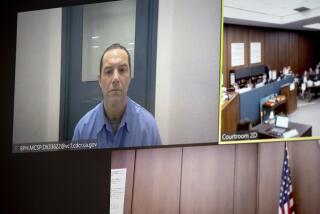Spector Loses Ruling on Testimony
Dealing a serious blow to Phil Spector’s murder defense, a judge ruled Thursday that police can testify the famed music producer initially described actress Lana Clarkson’s shooting death as an accident and not a suicide, as he later claimed.
Los Angeles Superior Court Larry P. Fidler ruled that police were not interrogating Spector and did not have to read him his rights after they responded to his Alhambra mansion and found Clarkson dead in a chair in the foyer.
Fidler also rejected defense attorney Bruce Cutler’s argument that Spector, 64, had been “figuratively punched around until he said something.” Fidler said, based on his 30 years of legal experience, that Spector was “offered a lot more than most people.”
Spector, who created rock’s “wall of sound” recordings, sat passively through the four-hour proceeding dressed in a tan suit with his now-trademark knee-length jacket, platform shoes and dragonfly brooch.
Clarkson, 43, a cult movie actress who worked as a hostess at the House of Blues in Hollywood, died Feb. 3, 2003, after accompanying the producer home from the nightclub. Spector has pleaded not guilty to Clarkson’s murder and is free on $1-million bail. He faces life in prison if convicted.
The latest ruling opens the door for prosecutors to use Spector’s differing accounts of the shooting at trial.
At the murder scene, one officer allegedly overheard Spector say: “I didn’t mean to shoot her; it was an accident. I have an explanation for this.” Another officer taped a second statement: “The gun went off accidentally.”
Spector’s driver, Adriano De Souza, is expected to testify that Spector stepped out of his house minutes after a shot rang out and said he thought he had shot someone.
But later, at the Alhambra police station, Spector derided Clarkson for going to his house and “blowing her brains out.” He also told police that Clarkson sang two of the hit songs he produced, “You’ve Lost That Loving Feeling” and “Da Doo Run Run,” before she grabbed his handgun and killed herself.
Cutler, who made his name defending New York City mob figures such as John Gotti, flatly denied that Spector had made any incriminating statements.
“We deny in the clearest terms that he shot that lady and it was Mr. Spector’s gun,” Cutler said.
“We also deny in the clearest terms that Mr. Spector ever admitted that he shot that lady.”
Cutler argued that Spector was suffering withdrawal symptoms from seven prescription drugs when he made statements to police, and he said they refused or ignored the producer’s requests for this medication.
In a flourish right out of a television legal show, Cutler turned and repeated the word “medication” directly to the courtroom gallery.
Still, prosecutors on Thursday scored what amounted to a clean sweep.
Fidler also said Los Angeles County Deputy Dist. Atty. Douglas Sortino could present Spector’s 1975 conviction for brandishing a gun if the defendant decides to testify.
“This is just the beginning of a long series of events” in which the defendant “would resort to firearms-related violence against men and women if he doesn’t get what he wants,” Sortino said of the gun conviction.
The judge also ruled that the jury could be shown weapons seized from Spector’s house if they contained ammunition similar to the weapon used in the Clarkson shooting.
“It was a good day,” Sandi Gibbons, spokeswoman for the prosecutors, said outside court. “The judge made what we think are the proper rulings.”
The judge scheduled a trial date for Jan. 30, though the proceedings could be pushed back until April 24 for Cutler to complete the federal trial of two New York City police officers charged with being mob hit men.
More to Read
The biggest entertainment stories
Get our big stories about Hollywood, film, television, music, arts, culture and more right in your inbox as soon as they publish.
You may occasionally receive promotional content from the Los Angeles Times.










